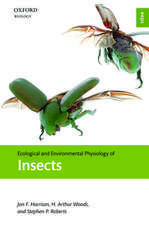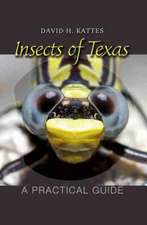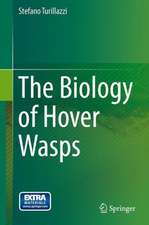Agricultural Proteomics Volume 2: Environmental Stresses
Editat de Ghasem Hosseini Salekdehen Limba Engleză Hardback – 4 sep 2016
| Toate formatele și edițiile | Preț | Express |
|---|---|---|
| Paperback (1) | 786.29 lei 38-44 zile | |
| Springer International Publishing – 13 iun 2018 | 786.29 lei 38-44 zile | |
| Hardback (1) | 804.86 lei 38-44 zile | |
| Springer International Publishing – 4 sep 2016 | 804.86 lei 38-44 zile |
Preț: 804.86 lei
Preț vechi: 1059.02 lei
-24% Nou
Puncte Express: 1207
Preț estimativ în valută:
154.01€ • 160.80$ • 127.46£
154.01€ • 160.80$ • 127.46£
Carte tipărită la comandă
Livrare economică 01-07 aprilie
Preluare comenzi: 021 569.72.76
Specificații
ISBN-13: 9783319432762
ISBN-10: 3319432761
Pagini: 415
Ilustrații: XI, 314 p. 23 illus., 21 illus. in color.
Dimensiuni: 155 x 235 x 24 mm
Greutate: 0.76 kg
Ediția:1st ed. 2016
Editura: Springer International Publishing
Colecția Springer
Locul publicării:Cham, Switzerland
ISBN-10: 3319432761
Pagini: 415
Ilustrații: XI, 314 p. 23 illus., 21 illus. in color.
Dimensiuni: 155 x 235 x 24 mm
Greutate: 0.76 kg
Ediția:1st ed. 2016
Editura: Springer International Publishing
Colecția Springer
Locul publicării:Cham, Switzerland
Cuprins
1. Well-designed experiments make proteomic studies on stressed plants meaningful; Brian J. Atwell
2. Cereal Root Proteomics for Complementing the Mechanistic Understanding of Plant Abiotic Stress Tolerance; Jennylyn L. Trinidad, Herra L. Grajo, Jose B. Abucay Jr., Ajay Kohli1
3. A proteomic view of the cereal and vegetable crop response to salinity stress; Katja Witzel and Hans-Peter Mock
4. Proteomics of Flooding-Stressed Plants; Mudassar Nawaz Khan and Setsuko Komatsu
5. Proteomic analysis of crop plants under low temperature: a review of cold responsive proteins; Javad Gharechahi, Golandam sharifi, Setsuko Komatsu, and Ghasem Hosseini Salekdeh
6. How proteomics contributes to our understanding of drought tolerance? Mehdi Mirzaei, Yunqi Wu, Paul Worden, Ante Jerkovic, Brian J. Atwell
7. The impact of heat stress on the proteome of crop species; Andrew P Scafaro and Owen K Atkin
8. Proteomics approach for identification of nutrient deficiency related proteins in crop plants;
Mohammad-Zaman Nouri, Mohammad-Reza Ghaffari, Mohammad-Reza Hajirezaei, and Hamid Sobhanian
9. Plant response to bacterial pathogens: A proteomics view; Sheldon Lawrence II, Jennifer Parker, and Sixue Chen
10. Plant fungus interaction proteomics: an update; Kanika Narula, Pooja R. Aggarwal, Niranjan Chakraborty, and Subhra Chakraborty
11. Insight into physiological, molecular, and proteomic changes associated with phytoplasma infection in crop plants; Javad Gharechahi, Golandam Sharifi, Mohsen Mardi, and Ghasem Hosseini Salekdeh
12. Insect pest proteomics and its potential application in pest control management; Mehdi DastranJ, Javad Gharechahi, and Ghasem Hosseini Salekdeh
13. Proteomic Research on Honeybee Diseases; Yue Hao and Jianke Li
14. Application of Proteomic Biomarkers in Livestock Disease Management; Ehsan Oskoueian, Peter David Eckersall, Elena Bencurova, Thomas Dandekar
Notă biografică
Dr. Ghasem Hosseini Salekdeh received his PhD from International Rice Research Institute (IRRI). He is currently Associate Professor at Agricultural Biotechnology Research Institute of Iran. His research focuses on discovering novel pathways and genes using proteomics and genomics approaches. He also works on recombinant protein expression technologies.
Textul de pe ultima copertă
This book will cover several topics to elaborate how proteomics may contribute in our understanding of mechanisms involved in stress adaptation. The knowledge being accumulated by a wide range of proteomics technologies may eventually be utilized in breeding programs to enhance stress tolerance. This book presents comprehensive reviews about responses of crop and farm animals to environmental stresses. Challenges related to stress phenotyping and integration of proteomics and other omics data have also been addressed.
According to FAO’s estimate, the number of people suffering from chronic hunger has increased to over a billion. Due to most of the extreme poor who suffers from hunger live in rural areas, the effort to enhance agricultural productivity will be a key element in reducing the number of global population suffering from hunger. This goal will not be achieved unless we develop new genotypes of food crops and animals that will both improve production under sub-optimal conditions. The discovery of genotypes with the capacity to cope with these problems suggests that increasing the support of breeding for fragile environments is a viable strategy for uplifting the rural poor. However, breeding for environmental stresses, is a slow and inefficient process. Also several genotypes with good stress tolerance environmental stresses have been identified or developed, it is difficult to transfer these traits into elite backgrounds because they are genetically very complex. One possibility currently being evaluated for enhancement of stress tolerance is to apply biomarkers in breeding programs to follow the inheritance of major genes that are difficult to phenotype, such as pyramids of disease resistance genes of similar effect. Proteomics is a powerful approach to identify proteins associated with stress tolerance. It offers an entry point for identifying possible significant changes in protein levels against a background of unresponsive proteins.
The application of proteomics is usually initiated by detection of stress responsive proteins thought comparison between stressed and control organisms. Identification of these expressional candidate proteins may then reveal that some of them have functions clearly consistent with the stress tolerance trait. Other relevant information including the expression pattern at mRNA and metabolomics may help to further verify the correlation of these candidate proteins with desirable traits. The step forward from collecting proteomics data to functional prediction will pave the way for the sustainable agricultural production under unfavorable environmental conditions.Caracteristici
It covers several applications of proteomics in analysing stress responses in crops and farm animals
It suggests possible application of proteomics in enhancing stress tolerance in crops and farm animals
It gives researchers and students many ideas for future research projects
Includes supplementary material: sn.pub/extras
It suggests possible application of proteomics in enhancing stress tolerance in crops and farm animals
It gives researchers and students many ideas for future research projects
Includes supplementary material: sn.pub/extras













